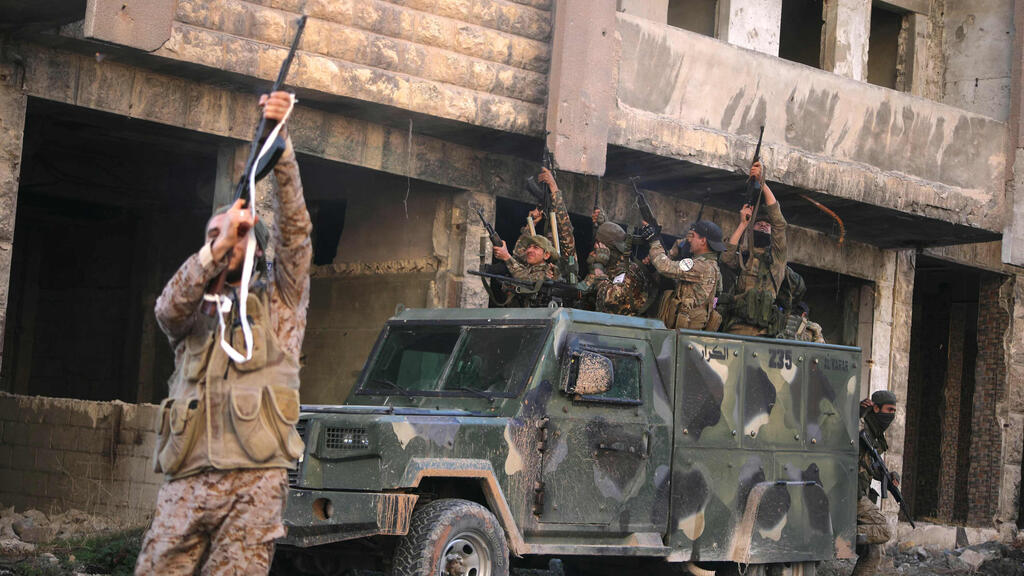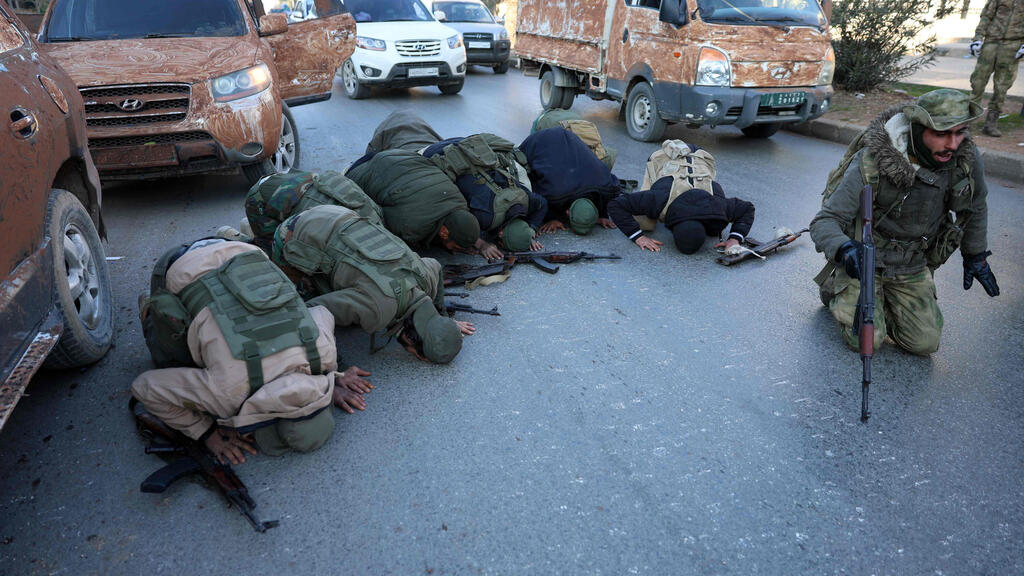Getting your Trinity Audio player ready...
Syrian President Bashar al-Assad on Saturday vowed to defeat the insurgent offensive launched against his military forces in the Idlib province in northern Syria.
According to a report in the state news agency SANA, Assad spoke with UAE President Mohammed bin Zayed and said his troops "continue to defend its territorial integrity against all terrorists and their supporters and is capable, with the help of its allies, of defeating and eliminating them — no matter how severe their terrorist attacks." SANA reported that bin Zayed affirmed Abu Dhabi’s support for Syria.
Syrian rebels removing Hezbollah flags
The militias launched a surprise assault against Assad’s regime last Wednesday, marking the biggest military push taken by the militant force in the country in four years. The rebels reportedly took advantage of the weakened state of Assad's allies in the civil war, especially Hezbollah — which had suffered significant blows from Israel before the two sides agreed to a cease-fire.
Reports indicate that Assad's forces were caught off guard by the rebels, who launched their attack from their last major stronghold in Idlib Province in northwestern Syria. The surprise offensive began last Wednesday, coinciding with the enactment of a cease-fire in Lebanon.
The assault was being led by several rebel factions, spearheaded by the jihadist group Hayat Tahrir al-Sham and in coordination with Turkish-backed rebel forces. Fighting erupted within Aleppo on Friday, Syria’s second-largest city and a strategic and symbolic stronghold. Reports suggested the rebels had taken control of most of the city by Friday.
This marks a dramatic and highly symbolic victory for the rebels. Aleppo, a city with a history spanning thousands of years and home to 2.3 million people before the war, was the rebels' main stronghold in the previous decade.
They captured it in 2012 but were forced to retreat in 2016 following a brutal bombardment campaign by Assad's forces and the Russian air force, which flattened large parts of the city.
On Saturday, reports emerged that the rebels had also seized Aleppo's international airport. In dramatic footage, rebels were seen celebrating in the city’s streets, including near its historic citadel, removing regime symbols and Assad posters.
It appears their advance has faced little significant resistance so far, with Syrian officials admitting Assad’s forces had retreated from several areas. Assad’s government officially declared a "reorganization" of its forces to prepare for a counteroffensive to reclaim lost territory.
Alongside the main offensive on Aleppo, the rebels have completed their capture of all of Idlib Province — most of which was already under their control — and pushed south toward Hama. Although Assad's forces denied reports of a retreat from the area, the rebels appeared to have made advances.
Russia has intervened to support Assad with a series of airstrikes conducted by its fighter jets operating from Latakia. Russian aircraft bombed Aleppo for the first time since 2016. The clashes have so far claimed over 327 lives, primarily from Assad’s forces and the rebels, though the toll includes dozens of civilians.
In his first response to the surprise attack, Assad vowed that Syria is capable of defeating the rebels. According to the Syrian state news agency SANA, Assad spoke with UAE President Mohammed bin Zayed, stressing that "Syria continues to defend its territorial integrity against all terrorists and their supporters and is capable, with the help of its allies, of defeating and eliminating them — no matter how severe their terrorist attacks." The statement added that bin Zayed affirmed Abu Dhabi’s support for Syria.
Should Israel be concerned?
The main global concern of the attack is the potential for renewed chaos in Syria after years of apparent stabilization and Assad's reintegration into the Arab world. Renewed instability could empower extremist groups like the Islamic State.
In Europe, where the effects of the massive migrant crisis from the peak of the Syrian civil war are still felt, leaders are particularly wary of facing another wave of refugees.
3 View gallery


Prime Minister Benjamin Netanyahu, fighting in Syria
(Photo: Kobi Gidon, GPO, Omar HAJ KADOUR / AFP)
Israel is closely monitoring developments, with Prime Minister Benjamin Netanyahu holding an unusual discussion on the matter back on Friday. Ynet’s Military and security correspondent Ron Ben-Yishai noted that in the short term, the situation might actually benefit Israel's security.
Get the Ynetnews app on your smartphone: Google Play: https://bit.ly/4eJ37pE | Apple App Store: https://bit.ly/3ZL7iNv
Assad, weakened and losing control, is unlikely to provoke confrontations with Israel and will probably exercise caution regarding Iranian efforts to deliver aid to Hezbollah through Syrian territory.
However, long-term concerns remain. The Sunni rebels include jihadists who are no less dangerous than the Shiite jihadists operating under Iran's patronage.






